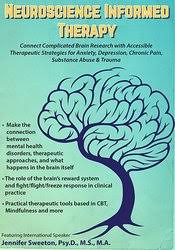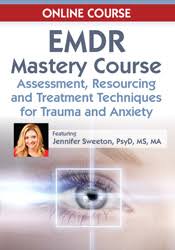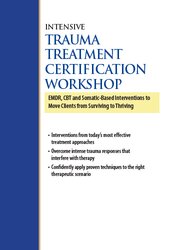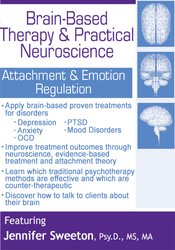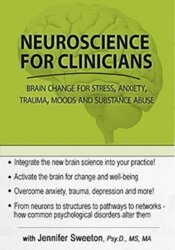What You’ll Discover in Jennifer Sweeton 2-Day Mastery Course on Neuroscience Informed Therapy Connect Complicated Brain Research with Accessible Therapeutic Strategies for Anxiety, Depression, Chronic Pain, Substance Abuse & Trauma
- Faculty:
- Jennifer Sweeton
- Duration:
- 12 Hours 23 Minutes
- Format:
- Audio and video
- Copyright:
- Sep 27, 2018,
Description
Recent neuroscience findings have provided amazing insight into the brain’s workings and their connection to psychological and physical well-being.-being. Yet in-depth studies on The brain can be complicated for Mental health professionals to interpret -names “Subgenual anterior cingulate cortex” It means very little to many of us.
The problem is not limited to terminology. How can you overcome the challenges of applying complex scientific and biological information in your clinical practice? How does neuroscience help you when you’re face-To-face with Clients working on What are the problems that they face every day, such as stress, depression, addiction?
This recording will link science and biology concepts to your clinical work. with Anxiety, depression, substance abuse, trauma, and chronic pain.
Better still, you’ll go beyond the biological mechanisms that underlie various disorders with Instructions in detail on actual treatment strategies you can use with Your clients. Through case studies, experiential exercises, and brief lectures you’ll learn to individualize interventions based in Mindfulness Based Cognitive TherapyTreatment of mood disorders, trauma, addictions, attachment, and somatic psychologies.
Better still, you’ll have the opportunity to practice the application of what you’ve learned under the skilled supervision of our instructor, and take home detailed handouts allowing their immediate incorporation into your clinical work.
Discover how neuroscience understanding can transform your view of and work by cutting through the confusing research and obscure jargon with You can help your clients!
Handouts
| Manual Neuroscience Informed Therapy (3.92 MB) | 104 pages | Available after Purchase |
Outline
DAY 1
Understanding the Brain’s Reward System
- Habit formation and maintenance
- Why the brain doesn’t always choose well
- The conscious brain myth
- Brain dictated actions
- Routines vs. impulse
- Reward & habit
- Coping & stress
- Brain-wise change
- Strategie for impulse
- Serotonin
- Solidifying change – from neurons to brain regions
- From state to trait: Short experiences that lead to lasting change
- Willpower
- Willpower: Where is it located?
- Role of exercise
- Mindfulness
- A quick willpower workout
The Body’s Impact on The Brain: Manage Stress and Anxiety by Altering Your Physical State
- Body-Brain-Mind Talk
- The Vagal Nerve
- Variability in heart rate
- Interoception
- Develop stress resilience and emotional regulation
- Deep relaxation, breath, posture
- The Body-Brain-Mind connection in all treatment approaches
The Brain’s Impact on The Body
- Chronic Neurotransmitters, pain, nociceptors, neurotransmitters
- The centralization and dorsolateral frontal lobe are key factors in the centralization pain
- Stress can have a negative impact on your health on Inflammation and pain
- Measuring pain
- CBT interventions for pain reappraisal
- Pain catastrophizing
- Biofeedback
- Mind-Interventions to the body for Pain
How relationships change Brain: Neuroscience Attachment
- Neuropeptides: Behavior and Oxytocin
- Social brain healing
- Storytelling and its importance
- The brain is in love
- Brain Long-term behavior-Love is a term
- It’s a matter of novelty versus habit
- Engendering secure attachment
- Key brain networks
- Develop compassion and empathy
DAY 2
A Depressed Person Brain To be a Resilient Brain
- How the brain of a depressed person gets stuck
- Laterality in the Hemispherics
- Cytokines & depression
- The neuroscience behind guilt and shame
- Opposing paths
- Brain Intercommunication
- Gratitude – neurochemistry & practice
- Neurofeedback: Research on Direct communication with The brain
Trauma The Science of Memory and Treatment
- Grounding
- Titrating emotions with mindfulness
- Trauma: The fight/flight/freeze response
- Executive functioning
- Implicit memories
- Dual awareness
- Brain savvy narratives
- Breath/Movement/Awareness
- Treatment of shame after trauma
The Addicted Brain: Clinical Implications for the Neuroscience The Craving
- The reward center’s role
- The neuroscience behind craving
- Mindfulness and movement-based support
- Identifying and underlying beliefs
- Dual awareness
- Avoid conflict and take control of your risk
- The Aging Brain
- Brain There are many changes throughout your life
- Memory enhancement strategies
- Buffering from Alzheimer’s Disease
- Is Mindfulness a neuroprotective method?
Nutrition & The BrainWe are what we eat!
- Nutrition for optimal brain functioning
- The brain on Sugar
- Nutraceuticals
- The creation of an inter-disciplinary team
The Limitations of Neuroscientific Research Research Potential Treatment Risks
- fMRI imaging – blood flow vs. neuronal activity
- The incomplete picture that can be gleaned from only brain activations
- Study size and validity of neuroscientific studies
- Animal research – directly applicable to humans?
- Psychotherapeutic techniques – specific limitations and risks
Faculty

Jennifer Sweeton, Psy.D., M.S., M.A. Similar seminars and products 12
Organisational Consultant, Clinical Psychoologist
Mind Works Professional Education Inc
Dr. Jennifer Sweeton She is a licensed clinical psychologist and author.-Recognized expert on Trauma, anxiety, and neuroscience in mental health. Dr. Sweeton Has been using EMDR since 1998 for It has been in practice for almost a decade, and has successfully treated a wide range of patients using EMDR or other memory reconsolidation methods, including combat veterans and individuals. with Complex trauma and PTSD treatment for those in need-Resistant anxiety
She received her doctoral training from the Stanford University School of Medicine and the Pacific Graduate School of Psychology. for PTSD. Additionally, she holds a master’s degree in affective neuroscience from Stanford University, and studied behavioral genetics at Harvard University.
Dr. Sweeton She resides in Kansas City, Kansas, and is the owner of Kansas City Mental Health Associates, a private group practice. She was the past president of Oklahoma Psychological Association, and she holds adjunct faculty positions at the University of Kansas School of Medicine. She is currently the president-The Greater Kansas City Psychological Association elects. Dr. Sweeton Provides psychological services to clients in Oklahoma, Kansas and internationally.-She is a neuroscience and trauma expert who has trained thousands in mental health professionals in her workshops.
Disclosures for Speakers
Financial: Jennifer Sweeton She is a private practitioner. She is in a relationship of employment with The Oklahoma City VAMC. Dr. Sweeton PESI, Inc. gives a speaking honourarium
Non-financial: Jennifer Sweeton Has no pertinent non-financialOnline viewing or digital downloadrelationship to disclose.
| Online Viewing or Digital Download | Jennifer Sweeton – 2-Day Mastery Course on Neuroscience Informed Therapy – Connect Complicated Brain Research with Accessible Therapeutic Strategies for Anxiety, Depression, Chronic Pain, Substance Abuse & Trauma
IMPORTANT: This is it. “Jennifer Sweeton – 2-Day Mastery Course on Neuroscience Informed Therapy – Connect Complicated Brain Research with Accessible Therapeutic Strategies for Anxiety, Depression, Chronic Pain, Substance Abuse & Trauma” Completely Downloadable And Available Check your account
(If a link is not working, we will quickly renew it.
We are grateful for your patience.


